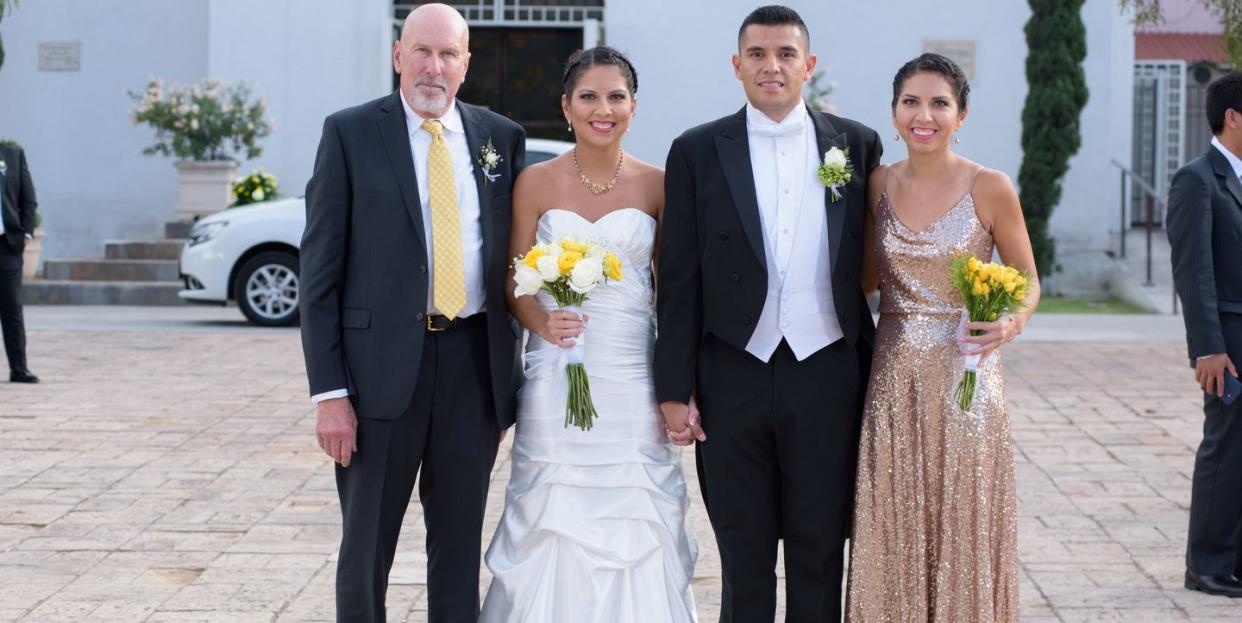‘I’m A Biracial Woman Of Color, And This Is How I Talk To My White Family About Race’

Ask any person of color to tell you about their first experience with racism and chances are, they’ll remember it in detail. Mine was in kindergarten: A white boy told me he didn’t want to sit with me because I was Black. My initial reaction wasn’t just that he was incorrect (I’m a biracial Latina, half Peruvian and half white) but also confusion as to why being Black would be a bad thing. At that point, my parents had never talked to me about racism; it wasn’t until I brought it up as an adult that we got into it.
That wasn’t easy either. Like most people who are BIPOC (Black, Indigenous, and/or a person of color), I’ve experienced racism, but my family gets defensive about it. Casting blame is not my intent; I just want acknowledgment that these things happened (and are still happening) and are wrong.
Convos in this realm are common in our current world, says Melissa L. Whitson, PhD, an associate professor of psychology at the University of New Haven. That’s whether you’re a POC struggling to be heard or a white person who wants to be an ally. Tackle tough chats with the right tools.
Your fam
There might be lots of love, but familial ’ships also come with generational differences and emotional baggage, plus “ideas become part of our identity, so people often take these conversations personally,” says Oludara Adeeyo, a psychiatric social worker and psychotherapist based in Los Angeles.
Make your convo count: If you have something you’d like to address with a family member—say, asking them to acknowledge racism, a convo I’ve had with my dad—be aware of the time and place, and give the talk the weight it deserves. Maybe you grab some alone time one morning, instead of waiting until you’re at the holiday dinner table with everyone. Then, “listen and try to understand why they think what they think, without attacking them or expecting them to change their mind immediately,” says Adeeyo.
In my case, my dad was initially defensive when discussing my experiences with discrimination, but I’ve made it clear that my only intention is to feel heard and for him to say he’s sorry they happened. It took patience, but he’s been willing to do that.
And, hot tip for the holidays: Tempers will flare if anyone has been drinking, so have these talks only if everyone is sober. If things still grow tense, calmly walk away. Suggest revisiting later so no one feels they won or lost, says Brittany A. Johnson, a mental health counselor in Indiana and author of Get Out of Your Own Way: 21 Days to Stop Self Sabotage.
Your S.O.
It’s 100 percent possible to have a successful relationship with someone whose political affiliations don’t mirror yours. In fact, almost 30 percent of married couples have different political affiliations, says a recent PLOS One study. “Understanding why someone affiliates with their party—economics over social issues, for example—can help you determine where to draw your line,” says Whitson. But you do need to consider that line. Maybe you can deal with having different tax philosophies, but someone dismissing your personal experiences, not so much. “Reflect on which issues you’re okay not seeing eye to eye on.”
Make your convo count: “You don’t need to bring up heavy topics on a second date, but if you’ve been together for a couple of months and things are feeling serious, it’s time to get these conversations going,” Whitson says. “The further you’re into a relationship, the harder it is to end it.”
Already in deep and uncovering surprising issues? First, identify the core of the problem: Did your partner vote for a different candidate than you did? (If so, why?) Or do they straight-up invalidate your experiences? It’s okay—ideal, even!—to get personal, because, well, it is. You’re talking about your life, and you want the number one person in it to have your back. “Explain why these issues are important to you, using specific examples,” Johnson says, “and note how not listening is damaging the trust in the relationship.” If things get heated, seek help from a professional who can mediate and address the additional issues—say, a lack of support—at play.
Your social feed
The public nature of social media means two things: 1) It’s possible to get a ton of eyeballs on your message, but 2) talks often go off the rails…fast. A conundrum, right?
Make your convo count: A few signs someone is open to social media debate (not an all-out war): They ask questions, post links to their sources, and avoid personal insults (you should do the same, btw). On Twitter (if you use it!), another effortless way to tell is by downloading the Bot Sentinel extension for Chrome and Firefox, which analyzes a user’s posts and gives ’em a troll rating right next to their handle, so you can avoid the bad-for-everyone convos that go nowhere with people you don’t know IRL.
Once you’re ready to chat, remember: People are more defensive in a public setting, so they’re likely to sharpen their claws in a debate. Send your friend or in-law a private message instead of going at it in the comments. Tone often gets lost in text and can read harsher than intended. Try: “I thought you’d find this story interesting,” not “You need to read this.”
You Might Also Like

